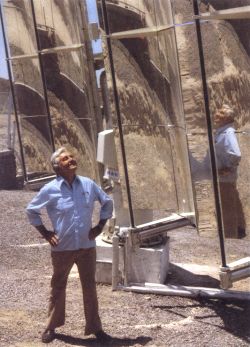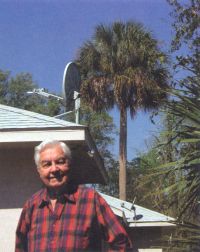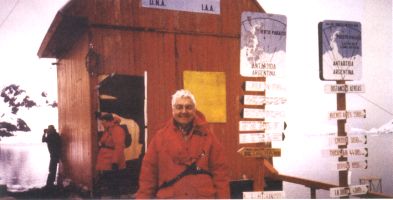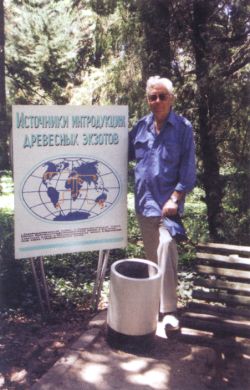The new Conway Eco-Site project involves several elements:
- A small, privately maintained nature preserve, the Mockernut Botanical Garden.
- A family residential compound in a quiet rural area surrounded by magnificent vegetation.
- A private library and research facility away from distractions and interruptions.
- A farm for growing vegetables and fruit — and later, a greenhouse.
- A barn and pastures for the horses of children and grandchildren.
- A high-speed satellite link to colleagues and data sources around the world.
 PICHILINGE, MEXICO. Visiting an experimental site for desalting seawater using solar energy.
|
|
The site chosen for the project is in a part of Central Florida well removed from busy tourist destinations and high-density development. “We were first attracted to the area because of family interests,” Conway says. “Our daughter Linda, an ecologist, has been living and working in the area for some years. Our younger daughter Laura attended the University of Florida. Also, the older generation wanted a mild climate.”
About 10 years ago, Linda began a search for the site and pinpointed an area between Gainesville and Ocala in Marion County. Conway then assembled several tracts having a total of about 100 acres. The primary appeal was a great variety of habitats and topography having outstanding conservation merit. During ensuing years, the property was improved by clearing trash from sinkholes, removing invasive plants, cutting fire trails and seeding wild flowers.
Today the “compound” consists of three residences, a family library and a barn under construction. It is truly a hideaway. No structures are visible from the road. Entrance is via an unpaved one-lane drive that winds around a wetland and through a wooded area. “The nature of the project is such that we expect most of our visitation will be electronic. Physical visitation will be by invitation only,” Conway explains.
 “We hope we can develop a prototype habitat that may be of interest to many people,” says Mac Conway.
|
|
Among factors that influenced the location decision was the availability of abundant water. “In a world which will be plagued by water shortages and conflicts for the next several decades, it will be comforting to know that we sit atop the great Floridian aquifer,” he points out. The compound is served by two deep wells.
Also, the Conway people were drawn by the proximity of the University of Florida with its impressive staff and by the number of strong conservation groups and natural preserves in the area. “We are also impressed by the land-use pattern. The large horse farms reveal a population of substantial citizens committed to the land,” Conway says. “Further,” he adds, “the neighboring small towns of Micanopy and McIntosh are delightful communities with a special charm and character.”
The Gainesville and Ocala airports were also a factor. Both Conway and his daughter Laura are veteran pilots and will use their private aircraft for frequent trips to Atlanta, where Conway’s corporate headquarters will remain.
Conway and his wife, Becky, moved to the site several months ago. “We plan to live here the rest of our lives, and we hope that will be a long time,” he says. He admits that they had misgivings about leaving Atlanta, where they met while still in school. Conway left his mark there where, as a member of the State Senate, he pioneered planning for such infrastructure projects as MARTA, the Metropolitan Atlanta Rapid Transit System. He is a member of the Georgia Tech Engineering Hall of Fame.
 ANTARCTICA. Visiting the Argentine research station.
|
|
The resident “staff” at Eco-Site will consist of family members — the elder Conway, ecologist Linda, database manager Laura and Laura’s husband, journalist Jack Lyne. A former CNN staffer, Lyne edited Site Selection magazine for many years. He is now the executive editor of SiteNet, the web site of Conway Data. It is not planned to have any company employees at the site. All operating units of Conway Data will remain in Atlanta.
 YALTA, UKRAINE. Visiting the world-famous botanical garden developed by Russian scientists.
|
|
What does Conway expect to accomplish at this new location?
“First of all,” he says, “we hope to set an example for conservation. There are a lot of companies that have small land holdings for which they have no plans. Some were left over after acquisitions of major sites for manufacturing plants and other facilities. Many of these properties are simply forgotten. They may be neglected. Collectively, these small properties constitute a significant potential reserve. Perhaps we can call attention to this opportunity.”
“Also,” Conway says, “we hope we can develop a prototype habitat that may be of interest to many people, such as old-but-not-retired people who wish to avoid the stress of 9-to-5 office routines; retirees who want to work part time, but not under pressure; those who wish to live in remote locations; those who are handicapped and cannot travel; and those who, for a variety of reasons, prefer to work at home.
“Around the world, there is a great wealth of talent that is now unused or under-used. We would like to help find ways to utilize this vital resource. Our staff in Atlanta is now building a file of professionals who wish to operate in the virtual environment of cyberspace. This is not a program for envelope stuffers and data-entry drones. It is specifically tailored for alert, intelligent, educated managers and executives.”

What kind of projects might such a group handle?
“We think these people would constitute a wonderful intellectual resource for setting up study panels, reviewing programs and projects, making analyses, and forecasting opportunities and risks. They would bring to the virtual conference table years of experience, geographic diversity and sharp, independent focus,” Conway says.






